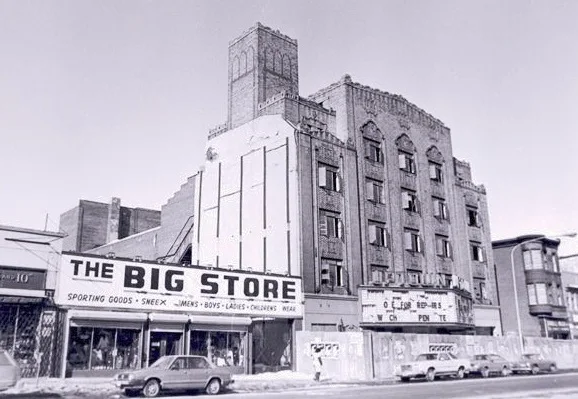In my opera, Easter, we have an overarching plot with a lot of smaller substories. And in those substories are front-facing characters with tie-ins to real-world happenings. Basically, what this amounts to is me trying to say that I couldn't tell the story of Easter without a ritornello.
What may be confusing to some people is that the prelude, Die, Detective!, is in itself a backstory, so to speak (sort of like a roman à clef), that sets up the remaining four (4) chords (you'll see). But, as it stands, this actual first chord features a number of times where the protagonist/antagonist must revisit his past in order (for the audience) to piece together present-day clues. Take, for instance, August 1978, where we find a young Montana-grown Joseph, full of hope+aspirations, caught between his military friend's personal strife, and his own ambitions of perhaps someday becoming a renown comedian.
Note (+): The comedian angle for Pascha is reminiscent of me. Part of my own biography is that I was a touring stand-up comic during my teenage years. I retired from the craft February 14, 2009, but I *think* I still have some funnies left. In this chord, pretty much all of the jokes spoken are mine. I consider it a natural extension of what Bruce Willis brought to the John McClane role, where he would make wisecracks throughout. Also, Philadelphians (particularly folks from West Philly) have a special kind of humor that I'm excited to showcase here.🤪 |

That Summer (Labor Day weekend), Philadelphia's famed Uptown Theater is closing its doors due to increasing blight in the north part of town*; the neighborhood is no longer as safe and vibrant as it was just a decade prior. The African-American community is still feeling the effects of the Civil Rights Movement, compounded with first Chief of Police and then-Mayor Frank Rizzo's antics and policies frozen in place during that decade. Turning inward, the Community becomes increasingly activist, self-destructive, and simulataneously self-expressive [in my opinion, some of the most beautiful music from that era came directly out of Philly]. In the middle of all this we have some blue-eyed soul, a young Pascha who is also struggling to find his place in the world as he chases his dreams, follows his heart, and succumbs to destiny. This part of the story (fictitiously what transpires in the aftermath of the Amateur Night held on Saturday August 5, 1978) is the most pivotal in telling because the events define who and what our eponym is (to become).The venue's
closure🔒 part is factual, but the date(s) may not be accurate.
The significance of the Uptown Theater cannot be understated here (it was added to the National Registry of Historic Places in 1982). Factually, Georgie Woods ceased to produce shows in/by 1972, not 1978. I, of course, am |
 Again, in bringing this flashback to life, there was a lot of second-hand study done during my research, but I had a few allies here. There are people still around who can vividly recall the days when acts such as The Supremes were booked to perform at the venue on the cheap (relatively speaking, $400 for a 10-day residency!!!🤯). Uptown Theater was also a staple on the so-called Chitlin' Circuit. Many of the acts (colored or otherwise) over a period of time were brought in courtesy of Georgie Woods, himself a voice (literally, he worked in radio🎙️📻) instrumental in getting other voices in the Community heard at a time when the work to do so was still greater than the payoff. As they say, old habits die hard. In Die, Detective!, Woods is portrayed (an indirect representation) by native Philadelphia personality, Rock Hefner, who - as Bobbe Penn (the name was his pick) - brings his own individuality to the role.
Again, in bringing this flashback to life, there was a lot of second-hand study done during my research, but I had a few allies here. There are people still around who can vividly recall the days when acts such as The Supremes were booked to perform at the venue on the cheap (relatively speaking, $400 for a 10-day residency!!!🤯). Uptown Theater was also a staple on the so-called Chitlin' Circuit. Many of the acts (colored or otherwise) over a period of time were brought in courtesy of Georgie Woods, himself a voice (literally, he worked in radio🎙️📻) instrumental in getting other voices in the Community heard at a time when the work to do so was still greater than the payoff. As they say, old habits die hard. In Die, Detective!, Woods is portrayed (an indirect representation) by native Philadelphia personality, Rock Hefner, who - as Bobbe Penn (the name was his pick) - brings his own individuality to the role.
Note (+): At first, I had Bobbe Penn as part of a duo that was supposedly modeled after the music production team, Gamble & Huff, from that era. They were called 'GO' from 'Todd G' and 'Warren O'. There was a scheduling error with the would-be partner of one of the actors, so I went ahead with just making the producer solo. I then decided that music production (having to create 1970s-style R&B tunes) just for a solo act would be too costly, and wouldn't really add anything outside of a soundtrack. |
